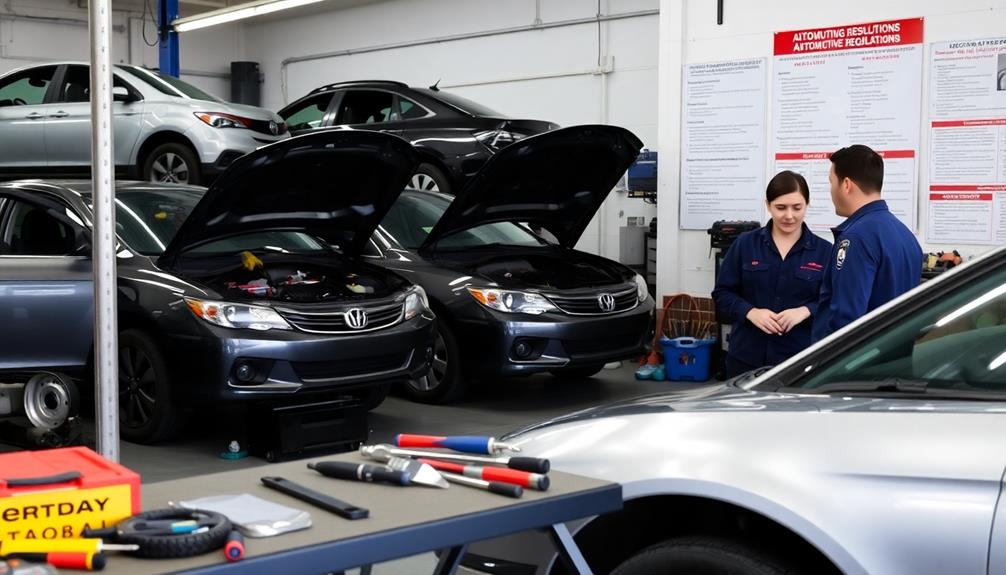Modifications to your vehicle become illegal when they violate local laws, emissions standards, or lack proper approval from authorities. If you change parts like exhaust systems or engine tuning without approval, you risk fines, vehicle impoundment, or voiding your warranty. Unapproved modifications can also increase emissions beyond legal limits, harming the environment. To stay compliant and avoid trouble, it’s essential to understand the regulations and confirm your upgrades are approved. Keep exploring to learn more about what makes mods legal or illegal.
Key Takeaways
- Modifications become illegal when made without proper approval from regulatory authorities.
- Installing unapproved aftermarket parts that increase emissions can violate legal standards.
- Altering vehicle systems without certification may void warranties and breach safety regulations.
- Using unapproved modifications can lead to vehicle impoundment, citations, or fines.
- Making changes that do not comply with local laws and environmental regulations renders the vehicle illegal for street use.

Recently, authorities have made it illegal to modify certain vehicles and equipment without proper approval. If you’re considering making changes to your vehicle, it’s essential to understand how these modifications can impact not only legality but also your vehicle’s performance and warranty. One of the main concerns with unapproved modifications is their effect on vehicle emissions. Many aftermarket parts, such as exhaust systems or engine tuning devices, can increase emissions beyond legal limits. This not only contributes to environmental pollution but also puts you at risk of hefty fines if authorities discover your vehicle is emitting more pollutants than allowed. Law enforcement and regulatory agencies are cracking down on illegal modifications, especially those that compromise air quality standards.
You might be tempted to upgrade your vehicle for better performance or aesthetics, but doing so without proper approval can void your warranty. Manufacturers often specify that any modifications not approved by them could result in the loss of warranty coverage. That means if your vehicle develops a problem linked to a modification, you’ll be responsible for all repair costs. For example, installing a custom air intake or chip tuning device might boost horsepower temporarily, but it could also interfere with your engine’s sensors and systems, leading to potential damage and costly repairs. If these issues are traced back to unapproved modifications, the manufacturer can refuse to cover related repairs under warranty. This can leave you stranded with expensive fixes, especially if you’re relying on your vehicle for daily commuting or business.
Understanding the legal limits of vehicle modifications isn’t just about avoiding fines; it’s about protecting your investment. Making unauthorized changes can also make your vehicle illegal for street use, leading to citations or even impounding. Before you start modifying, check local laws and consult with certified professionals who can help you stay compliant. Some modifications might be legal if they meet specific standards or are approved by regulatory agencies, but many are not. It’s necessary to keep documentation of any approved modifications to avoid trouble during inspections or if you’re involved in an accident. Additionally, emission regulations play a significant role in determining what modifications are permissible, as they directly affect environmental standards. Ultimately, the safest route is to prioritize authorized upgrades that won’t jeopardize your vehicle’s legality or warranty coverage. This way, you can enjoy your vehicle’s enhanced performance without risking legal issues or costly repairs down the line.
Frequently Asked Questions
Can I Modify My Vehicle’s Emission System Legally?
You can modify your vehicle’s emission system legally if you follow state and federal regulations. Confirm your modifications don’t interfere with vehicle registration requirements or cause you to fail emissions testing. Keep records of your changes and get your vehicle inspected as needed. Check with local authorities or a certified mechanic to confirm your modifications meet all legal standards, helping you avoid penalties and keep your vehicle compliant.
Are There Penalties for Illegal Modifications in Different States?
You could face penalties that feel like a slap in the face or a hefty fine that could empty your wallet when violating state regulations and modification laws. Different states have strict rules, and breaking them might lead to hefty fines, license suspensions, or even vehicle impoundment. It’s essential to know each state’s specific laws before making modifications, or you risk turning your vehicle into a legal nightmare.
How Do I Verify if a Modification Is Legally Approved?
To verify if your modification is legally approved, start by checking the inspection requirements for your state or local jurisdiction. Make certain you review the necessary modification documentation, such as permits or approval notices. Contact your local vehicle or building department if you’re unsure, and request confirmation that your modifications meet all legal standards. This proactive approach helps you stay compliant and avoid potential penalties down the line.
Does Warranty Coverage Change After Modifications Become Illegal?
Did you know that over 60% of vehicle owners modify their cars? Once modifications become illegal, your warranty coverage often changes considerably. You might lose warranty implications related to the modified parts because manufacturers require legal compliance for coverage. If your modifications are deemed illegal, the manufacturer can refuse to cover repairs related to those changes, so always make sure your modifications meet legal standards to protect your warranty.
What Are the Best Practices to Avoid Illegal Modifications?
To avoid illegal modifications, always prioritize emissions testing requirements and choose compliant aftermarket parts. Research local laws before installing modifications, ensuring they meet emissions standards and vehicle regulations. Keep documentation of all parts and testing results in case of inspections. Regularly check for updates on emissions laws, and consult experts or authorized dealers to verify that your modifications are legal, helping you prevent potential fines or warranty issues.
Conclusion
As you consider modifying your vehicle, remember that illegal modifications can lead to hefty fines or even vehicle seizures. Did you know that over 30% of vehicles inspected in some states contain illegal modifications? Staying informed and compliant not only keeps you out of trouble but also guarantees your safety on the road. So, before making any changes, double-check local laws—your wallet and peace of mind will thank you.









